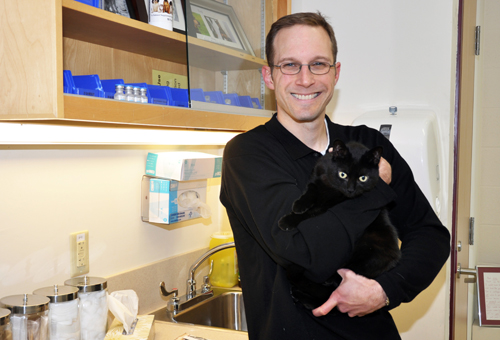
Salmonella, Campylobacter and ringworm are just some of the more than 70 pathogens that pets can transmit to humans. But don’t get rid of Fluffy and Fido just yet. Jason Stull, a PhD student in the Department of Pathobiology and a pet owner himself, values the bond between pets and people – he just wants you to practise safe pet handling and care.
“We recognize that pets play a really important role in people’s lives,” says Stull. “There are a number of studies that have documented the health benefits of having a pet.” Those benefits include reduced anxiety and lower blood pressure, but there are also health risks, which can be fatal in extreme cases. People who are most vulnerable to diseases transmitted by pets include children under age five, seniors, pregnant women and people with compromised immune systems, such as those with cancer.
“There are some bacteria that cats and dogs carry that are not good for us and can cause disease in people,” says Stull. Capnocytophaga found in most dogs’ mouths can cause life-threatening illness, especially in immunocompromised people, if the bacterium comes into contact with a mucosal lining or broken skin from a bite or scratch. Pasteurella multocida, a bacterium commonly found in the mouths of dogs and cats, can cause serious illness, including meningitis, in high-risk individuals who have been licked or bitten by a dog or cat. Bites can also cause painful, disfiguring wounds and infection. Exotic pets such as reptiles and amphibians carry the highest risk of transmitting Salmonella.
For his PhD thesis, Stull looked at public knowledge and concern about diseases transmitted by pets and behaviours that may increase humans’ risk of getting sick. He says these diseases are not well researched and people are often not well informed by their doctors or veterinarians.
In a survey at two doctors’ offices in the Region of Waterloo, more than 60 per cent of respondents reported having pets in their homes, but Stull found the public’s knowledge of pet-associated diseases to be lacking. “People for the most part were unaware of the health risks of pets,” he says. He also looked at households with children who were recently diagnosed with cancer at the Children’s Hospital of Eastern Ontario in Ottawa. Only one-third of the families surveyed recalled receiving any pet-related warnings from their doctor or veterinarian.
Stull found no difference in knowledge of pet-associated disease among households with or without high-risk individuals. “There was no difference in their attitudes,” he says. “There was no difference in their practices. That is a concern because these are groups that really should be better educated and potentially following different practices than the general public.” Stull says doctors and veterinarians need to discuss diseases with pet owners, especially those with high-risk family members.
Although he admits that it’s difficult to quantify the risks of certain behaviours, he says the risk is still there. High-risk activities include not washing hands after cleaning up pet waste and allowing pets to lick people’s faces. Aren’t dogs’ mouths cleaner than human mouths? It’s just a myth, says Stull.
Feeding raw meat or raw eggs to a pet is also considered risky, because these foods often contain harmful bacteria that can pass through the pet’s digestive tract. Uncooked pet treats such as pig ears can be a risk for Salmonella.
“You want to make sure people understand the potential severity of pet-associated diseases,” says Stull, “but fortunately severe disease is fairly rare. However, it’s easy to change our behaviours somewhat so that we can reduce the risks even further. The key is getting this information out to those that are at increased risk.”
His tips include:
– Wash your hands before and after pet contact, especially after handling pet waste.
– Temporarily remove high-risk pets from a household with high-risk individuals.
– Teach children how to interact with pets safely to avoid bites and scratches.
– Tell your doctor and veterinarian if you have any high-risk individuals and pets in your household.
For more information, visit www.wormsandgermsblog.com, maintained by Stull’s supervisor, Prof. Scott Weese.